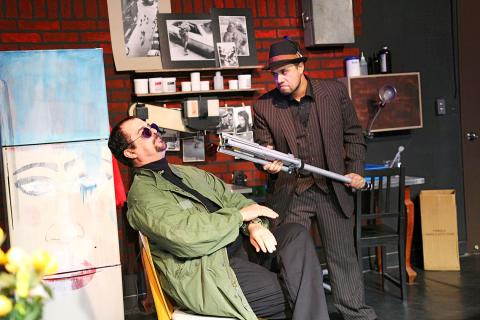Playwrights write; directors direct; actors act; and audiences watch. But what if you are blind? To survive you must learn to operate in the dark. Such is the world of Susy Hendrix, the central protagonist in the Lab Space’s version of Frederick Knott’s Wait Until Dark, a play well staged and directed by Brook Hall and Ting Kao (高詩婷).
As the play opens, con men Mike Talman (Dan O’Shea) and Carlino (John Brownlie) have been lured to the apartment of Susy (Esther Veronin) and her husband Sam (Andrew Chau) when they are out. They have been brought there by a ruthless Harry Roat (Stewart Glen) to help find a heroin-stuffed doll that Sam inadvertently brought home without Susy’s knowledge. But now the doll is missing and Roat and company seek to keep Sam at a distance and con the recently blind Susy into helping them find the doll. So the game begins.
SUPERB CAST

Photo courtesy of Michael Lao
Veronin shines in the challenging lead role, where she must play to the voices of the other characters and project her own voice with a mixture of credible vulnerability and strength, so as to outwit the deadly con artists.
Matched well against Susy are three diverse heavies, the gruff Carlino, a smoother Talman and the sinister Roat who will stop at nothing to win. Susy can out-psyche Talman, but Roat is a different matter. You would not want him as a neighbor. Helping Susy is the petulant girl next door, Gloria (played in alternate performances by Angelina Chen (陳冠如) and Danielle Beuker), who at first complicates the con, but helps Suzy in the end.
Set designer Yang Chih-yi (楊之儀) makes excellent use of the venue’s flexible space to create a basement apartment, which adequately contains the action while still suggesting additional dimensions with an outside streetlight and the hint of a back bedroom.
Jenna Robinette (costumes) and Adam Dupuis (specialty props) embellish a strong 60s feeling while Anton Botes adds his intriguing and original sound track.
Staged in cooperation with the Taipei City Government’s Department of Cultural Affairs, this is a dramatic show well worth seeing.

On April 26, The Lancet published a letter from two doctors at Taichung-based China Medical University Hospital (CMUH) warning that “Taiwan’s Health Care System is on the Brink of Collapse.” The authors said that “Years of policy inaction and mismanagement of resources have led to the National Health Insurance system operating under unsustainable conditions.” The pushback was immediate. Errors in the paper were quickly identified and publicized, to discredit the authors (the hospital apologized). CNA reported that CMUH said the letter described Taiwan in 2021 as having 62 nurses per 10,000 people, when the correct number was 78 nurses per 10,000

As we live longer, our risk of cognitive impairment is increasing. How can we delay the onset of symptoms? Do we have to give up every indulgence or can small changes make a difference? We asked neurologists for tips on how to keep our brains healthy for life. TAKE CARE OF YOUR HEALTH “All of the sensible things that apply to bodily health apply to brain health,” says Suzanne O’Sullivan, a consultant in neurology at the National Hospital for Neurology and Neurosurgery in London, and the author of The Age of Diagnosis. “When you’re 20, you can get away with absolute

May 5 to May 11 What started out as friction between Taiwanese students at Taichung First High School and a Japanese head cook escalated dramatically over the first two weeks of May 1927. It began on April 30 when the cook’s wife knew that lotus starch used in that night’s dinner had rat feces in it, but failed to inform staff until the meal was already prepared. The students believed that her silence was intentional, and filed a complaint. The school’s Japanese administrators sided with the cook’s family, dismissing the students as troublemakers and clamping down on their freedoms — with

As Donald Trump’s executive order in March led to the shuttering of Voice of America (VOA) — the global broadcaster whose roots date back to the fight against Nazi propaganda — he quickly attracted support from figures not used to aligning themselves with any US administration. Trump had ordered the US Agency for Global Media, the federal agency that funds VOA and other groups promoting independent journalism overseas, to be “eliminated to the maximum extent consistent with applicable law.” The decision suddenly halted programming in 49 languages to more than 425 million people. In Moscow, Margarita Simonyan, the hardline editor-in-chief of the